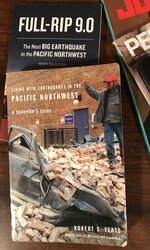Staff Member
Gold Lifetime
- Messages
- 21,834
- Reactions
- 63,228
If one has been following the trends in the west concerning water, it may be alarming and prompt change in life plans and/or preps. (There is another thread on the topic, but I didn't want to derail someone else's. And this one is to focus on specific preparations, rather general discussion.)
- "Millions of drinking wells around the world may soon be at risk of running dry. Overpumping, drought and the steady influence of climate change are depleting groundwater resources all over the globe, according to new research. As much as 20% of the world's groundwater wells may be facing imminent failure, potentially depriving billions of people of fresh water." — Harvey, C. (2021, April 27). "Millions of groundwater wells could run dry. "Scientific American. Retrieved November 7, 2021, from https://www.scientificamerican.com/article/millions-of-groundwater-wells-could-run-dry/.
- "The western United States is suffering from perhaps the most widespread and severe drought in recent history. As of early July, more than 98 percent of the American West was suffering from drought, with more than 80 percent in severe drought or worse. Extreme heat has struck several times since June, breaking records throughout the region and putting more than 20 million people under heat warnings from Canada to Mexico. Portland, Oregon broke a new record high of 115 degrees Fahrenheit; Seattle set a new record high of 108." — "Dying from the heat." Bulletin of the Atomic Scientists. (2021, July 16). Retrieved November 7, 2021, from https://thebulletin.org/2021/07/dying-from-the-heat/
- "Along the Oregon-California border in the Klamath Basin, taps are running dry. Federal officials decided not to divert water from a lake to farmers and ranchers after a year with little rain or snow. From Jefferson Public Radio, April Ehrlich reports that now businesses and homes are competing for precious little groundwater ..." — Ehrlich, A. (2021, August 27). Wells are running dry after farms and homes in Oregon compete for water. NPR. Retrieved November 7, 2021, from https://www.npr.org/2021/08/27/1031...hern-oregon-farms-and-homes-compete-for-water.
- "Aquifers provide us freshwater that makes up for surface water lost from drought-depleted lakes, rivers, and reservoirs. We are drawing down these hidden, mostly nonrenewable groundwater supplies at unsustainable rates in the western United States and in several dry regions globally, threatening our future." — Dimick, D. (2021, May 3). "If you think the water crisis can't get worse, wait until the aquifers are drained." National Geographic. Retrieved November 7, 2021, from https://www.nationalgeographic.com/...ter-california-drought-aquifers-hidden-crisis.
- The trends in mind, what are you, or will you, do on an individual or family level to meet this challenge?
- What practical steps, preparations, and equipment acquisitions do you have in mind?
- Are there any books or other literature you have found helpful?
- If implemented or planning systems to capture, store, and purify large amounts of water, what is being used and how is it going? On the other hand, what didn't work?
- If a relocation from your present location is something you have planned or are contemplating, how much does the water situation factor in to the planning?
- With the possibility of migrations and social unrest due to the aforementioned, how do you plan on addressing said? How do you see it shaking out?















